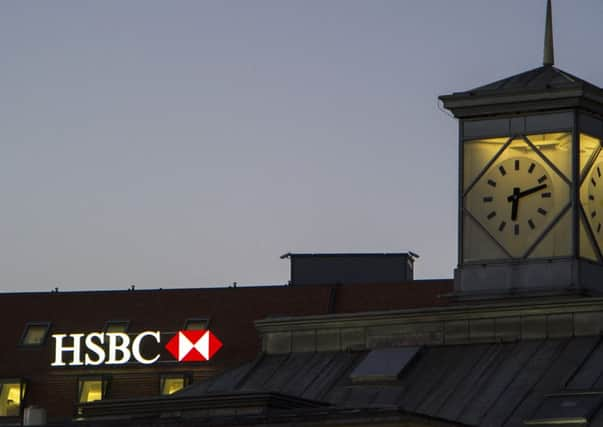Dani Garavelli: HSBC exposes Tories’ true colours


It’s not as if we could miss the contradiction inherent in wealthy individuals hiding millions of pounds of untaxed income in Swiss accounts, while tradespeople face the full force of the law for doing the odd homer. Or that we’d failed to notice the Black and White ball, which saw Tory donors paying £1,500 a ticket, took place the day after the story broke as, elsewhere, food banks struggled to deal with demand and local authorities considered what cuts they’d need to make to meet their austerity budgets.
Still perhaps David Cameron felt our faces weren’t being rubbed in it enough. Because shortly after it emerged HMRC had failed to prosecute Paul Bloomfield – a property tycoon who hadn’t paid tax for 24 years – the government announced it was planning to penalise those who are obese or in the grip of an addiction if they were found to be contributing to their own worklessness by refusing treatment. The proposed cuts to their sickness benefits will yield a tiny amount when set against the millions people like Bloomfield made, but will be enough, no doubt, to tip more families into poverty. The people involved are not work “evaders” – some of them are, at the very worst, work “avoiders” – but, when it comes to “milking” the welfare state, you never see politicians shrug their shoulders Lord Fink-like and say “everyone’s at it”; you never hear anyone talking about “vanilla” benefits scams.
Advertisement
Hide AdAdvertisement
Hide AdOther leaders might have been shamed by the revelation that a string of Tory Party donors and Fink, a former treasurer, had links with the bank at the centre of the tax-dodging allegations. Cameron, on the other hand, continued to peddle his poison on so-called welfare scroungers, while defending his decision to appoint former HSBC executive chairman Stephen Green as a trade minister in 2010. Apparently, he regards welfare reform as a “moral mission”.
Experts are forever explaining that cracking down on wealthy individuals or corporations is challenging. The line between tax avoidance (legal) and tax evasion (illegal) is blurred; it takes years to get cases to court and juries often acquit so it’s deemed better to offer offshore tax amnesties (which haven’t reaped the anticipated results) or to turn a blind eye, particularly if party bigwigs risk being drawn into the scandal.
Of course, many of those individuals who have faced public opprobrium over the non-payment of tax are operating within the law. Unreasonable though it seems, Arcadia owner Philip Green is entitled to save hundred of millions of pounds in tax by putting his company in the name of his wife Tina, who lives in Monaco, so long as he pays the correct amount on his salary, which he does. Others – including some of those with accounts in the Swiss arm of HSBC – are not.
Either way, sophisticated tax avoidance/evasion schemes are the preserve of those who can afford expensive and “flexible” accountants. The rest of us either pay up – as we should – or misrepresent our income in a cack-handed way, making us far more liable to be caught.
FOLLOW US
SCOTSMAN TABLET AND MOBILE APPS
Last year, HMRC announced that a “crackdown” had yielded £23.9 billion in additional tax; of this £8bn came from big businesses, £1bn from criminals and just £2.7bn from tax avoidance schemes, meaning more than half was recouped from smaller businesses and individuals.
Obviously, when trying to recover money “owed”, it is easier for the government to target the weak, but if the decision to do so is a question of logistics – as opposed to political priorities – why are the penalties for tax evasion so lenient while the sick and disabled are humiliated by work capability assessments and Jobcentre staff are put under pressure to meet sanction targets?
The gap between Britain’s elite and its under-privileged isn’t new, but seldom has it been more blatant. The child sex abuse inquiry fiasco has highlighted the way power protects itself and exposes the vulnerable. And we know the government’s austerity policies have impacted disproportionately on women and children.
One of the worst things about the fall-out from the HSBC scandal is that it has fuelled the notion of tax as a social ill, as opposed to the bedrock of a civilised society. As long as we focus on the legality as opposed to the morality of tax avoidance, the antipathy towards paying our dues will become ever more entrenched. This explains why it is difficult for the SNP to reverse the council tax freeze and why it spent the referendum campaign trying to sell us a vision of a Nordic society without the Nordic levies.
Advertisement
Hide AdAdvertisement
Hide AdTo be fair, why would anyone vote for a tax hike while other, wealthier people and companies appear to be shirking their civic responsibilities? But if we don’t see paying our whack as our duty then our services will continue to be eroded.
Now the government is promising to tighten tax evasion laws, making it easier to prosecute those hiding income in offshore accounts and introducing tougher penalties for those convicted. But such moves fall far short of the crusade Cameron is waging on benefits “cheats”. Given his record on protecting the rich at the expense of the poor, is anyone convinced he means business? «